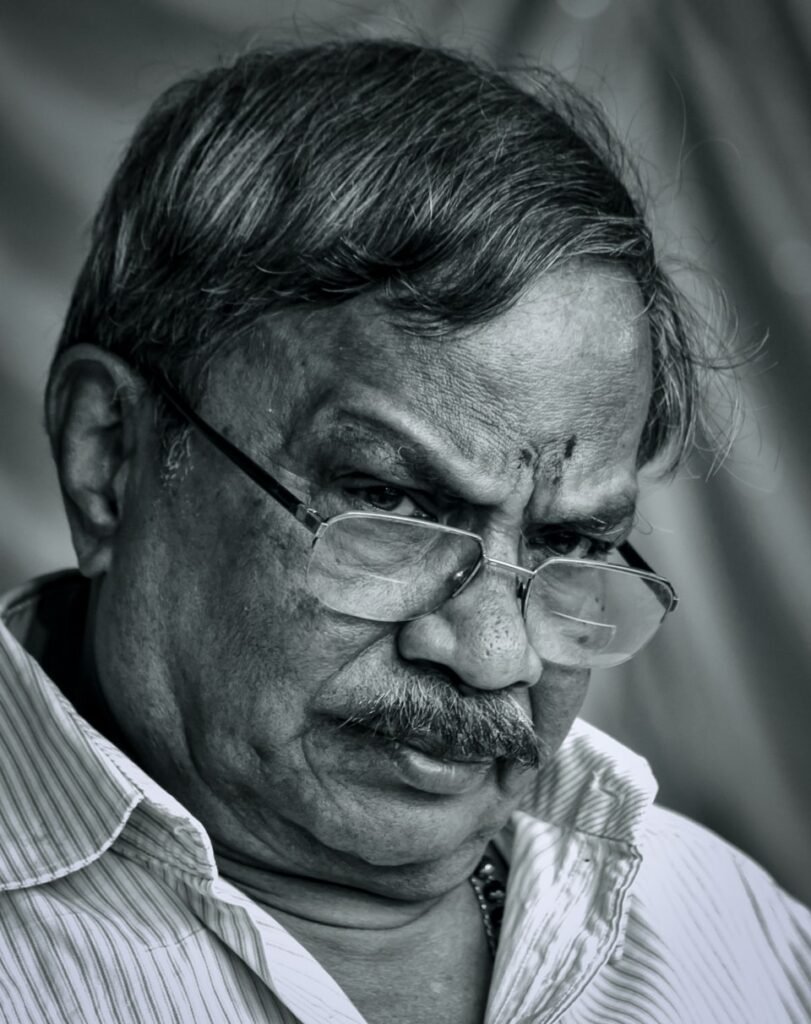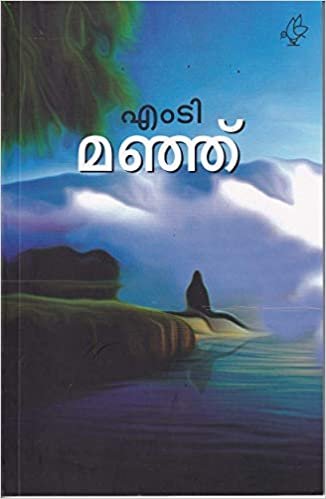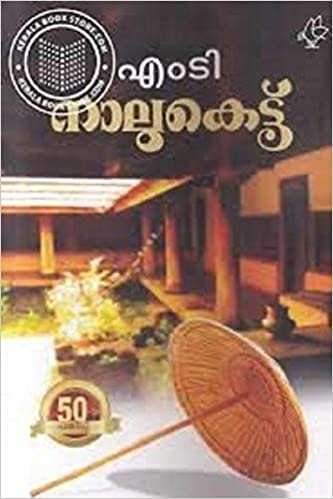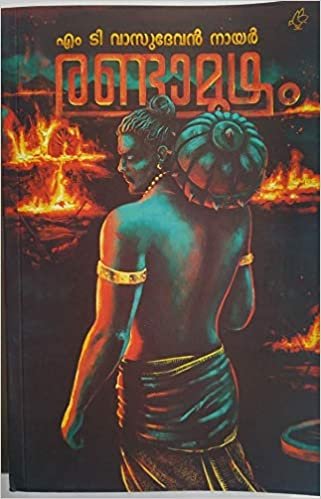| AUTHOR BIO | |
|---|---|
| Name | M. T. Vasudevan Nair |
| Profession(s) | Novelist, Screenplay writer, Film director |
| Date of Birth | 15 July 1933 |
| Age (as in 2021) | 87 years |
| Birth Place | Kudallur, Palakkad |
| Nationality | Indian |
| Hometown | Pattabmbi |
| School | Malamakkavu Elementary School Kumaranelloor High School. |
| College/University | Victoria College, Palakkad |
| Educational Qualification(s) | |
| Debut | Naalukettu |
| Family | Father- T. Narayanan Nair Mother- Ammalu Amma |
| Marital Status | Married |
| Spouse | Prameela (1965–1976; divorced) Kalamandalam Saraswathy (1977–present) |
| Children | Sithara, Aswathy Nair |
| Books | Naalukettu Randamoozham Manju Kaalam Asuravithu Iruttinte Athmavu |

Who is M. T. Vasudevan Nair?
M. T. Vasudevan Nair is an Indian author, screenplay writer, and film director. He was born on 15 July 1933 in Kudallur, Palakkad district. M. T. Vasudevan Nair is a scriptwriter and director of Malayalam films.
He is popularly known as MT. He is a prolific and versatile writer in modern Malayalam literature. He is one of the masters of post-Independence Indian literature. His popular works are Naalukettu, Randamoozham, Manju, Kaalam, Asuravithu, Iruttinte Athmavu.
M. T. Vasudevan Nair Biography
Vasudevan was born on 15 July 1933 in the Kudallur, which lies in the northwestern tip of Palakkad district, and shares a boundary with Malappuram district to three sides. He was the youngest of four children born to T. Narayanan Nair and Ammalu Amma. His father was in Ceylon and he spent his early days in Kudallur and in his father’s house in Punnayurkulam, a village in the present-day Thrissur district. He completed his schooling at Malamakkavu Elementary School and Kumaranelloor High School. He had to break education after high school, and when he joined the college in 1949, he was advised to opt for the science stream as it was felt that a degree in science secured a job faster than any other degree. He obtained a degree in chemistry from Victoria College, Palakkad in 1953. He taught mathematics in Pattambi Board High School and Chavakkad Board High School for over a year and worked in M.B. Tutorial College, Palakkad during 1955–56. He also worked as a gramasevakan at a block development office in Taliparamba, Kannur for a few weeks before joining Mathrubhumi Weekly as a subeditor in 1957.
His debut novel Naalukettu (Ancestral Home- translated to English as The Legacy), wrote at the age of 23. He won the Kerala Sahitya Akademi Award in 1958. His other novels include Manju (Mist), Kaalam (Time), Asuravithu (The Prodigal Son – translated to English as The Demon Seed), and Randamoozham (The Second Turn). The deep emotional experiences of his early days have gone into the making of MT’s novels. Most of his works are oriented towards the basic Malayalam family structure and culture and many of them were path-breaking in the history of Malayalam literature. His three seminal novels on life in the matriarchal family in Kerala are Naalukettu, Asuravithu, and Kaalam. Randamoozham, which retells the story of the Mahabharatha from the point of view of Bhimasena, is widely credited as his masterpiece.
M. T. Vasudevan Nair is considered one of the best 10 famous Malayalam writers
M. T. Vasudevan Nair Spouse
MT has been married twice. He married writer and translator Prameela in 1965. They separated after 11 years of marriage. He has a daughter from this marriage, Sithara, who works as a business executive in the United States. In 1977 he married dance artist Kalamandalam Saraswathy with whom he has a daughter, dancer Aswathy Nair. MT resides in Sithara, Kottaram Road, Kozhikode, named after his eldest daughter.
Books by M. T. Vasudevan Nair
Naalukettu
MT’s debut novel Pathiravum Pakalvelichavum (Midnight and Daylight) was serialized in Mathrubhumi Weekly in 1957. His first major work Naalukettu (The Legacy; 1958) is a veritable depiction of the situation which prevailed in a typical joint family when its fortunes are on a steady decline.
The title attributes to Nālukettu, a traditional ancestral home (Taravad) of a Nair joint family. The novel remains a classic in Malayalam fiction. It contributed to the renewal of a literary tradition initiated by S. K. Pottekkatt, Thakazhi Sivasankara Pillai, Vaikkom Muhammad Basheer, and Uroob in the 1950s. It was given the Kerala Sahitya Akademi Award in 1959.
It has had 23 reprints and was translated into 14 languages and had a record sale of half a million copies (as of 2008) and still features in the best-seller lists. MT himself adapted the novel into a television film for Doordarshan in 1995. It won the Kerala State Television Award for the year 1996.
Asuravithu
Asuravithu (The Demon Seed; 1972) which is set in a fictional Valluvanadan village named Kizhakkemuri can be considered almost as a sequel to Naalukettu. It has the same geophysical and socio-cultural setting. The novel describes the plight of the protagonist Govindankutty, the youngest son of a proud Nair tharavadu, as he is trapped between the social scenario, social injustice, and his own inner consciousness.
In Asuravithu there are clear indications of the damaging impact of an alien culture in the pollution of the indigenous culture and the disintegration of the family and the community. These two early novels—Naalukettu and Asuravithu—depict a phase in which the economic and cultural scenario of Kerala manifested symptoms that were to develop into dangerous ecocidal tendencies at a later stage.
Manju

Check Price
His later novels, such as Manju (Mist; 1964) and Kaalam (Time; 1969), are characterised by profuse lyricism which cannot to be found in Naalukettu or Asuravithu. The eco-feminist theme of patriarchal domination and exploitation gains more prominence in Manju, MT’s only novel with a female protagonist (Vimala). Set in the splendid landscape of Nainital, it stands apart as set in a milieu different from the usual one, the Valluvanadan village. The plot of the novel is allegedly similar to a Hindi story Parinde (Birds, 1956), by Nirmal Verma. However, both MT and Verma have rejected these claims.
Kaalam
In the novel Kaalam, MT returns to his favorite milieu, the dilapidated joint-family Nair tarwad set against the wider backdrop of the Valluvanadan village in the backdrop of the crumbling matrilineal order of Kerala in a newly independent India. Sethu, the protagonist, is toppled over by the eddies of social, cultural, and economic transformation.
Kaalam, though not strictly autobiographical, has a strong autobiographical element in it. Manju had a film adaptation in 1983, written and directed by MT himself. The novel also had a Hindi-language film adaptation titled Sarath Sandhya.
Randamoozham
Randamoozham (The Second Turn; 1984), widely regarded as the author’s masterpiece, retells the story of the Mahabharatha from the point of view of Bhimasena, supposed to be the son of Vayu; this is demystified or demythified in the novel. In this novel, Bhima gains, through the author’s ironic undertones, a new psychological depth. “I have not changed the framework of the story by the first Vyasa, Krishna-Dwaipayana. I have read between his lines and expanded on his pregnant silences,” says the author.
Other works
MT wrote the novel Arabi Ponnu (The Gold of Arabia) along with N. P. Mohammed. MT and Mohamed stayed in a rented house in Karuvarakkundu village, Malappuram for a period of two weeks to complete this work.
MT has authored two books on the craft of writing—Kaathikante Panippura and Kaathikante Kala—and his anecdotal columns articles on various topics and speeches on different occasions have been compiled under the titles Kilivaathililude, Kannanthalippookkalude Kaalam, Vakkukalude Vismayam, and Eekakikalude Sabdam. Manushyar Nizhalukal and Aalkkoottathil Thaniye are his travelogues.
He occupied and continues to occupy many important and powerful positions in various literary bodies including the presidency of Kerala Sahitya Akademi and the chairmanship of Tunchan Memorial Trust. He was an Executive Member of the Kendra Sahitya Akademi. The Library of Congress has in its collection sixty-two books, mostly by MT and some on him. Also, some of them are translations of his works into English. MT joined the Mathrubhumi Group of Publications in 1956. When he retired from there in 1998, he was their editor of periodicals and Chief Editor of Mathrubhumi Illustrated Weekly. On 2 June 1996, he was bestowed with honorary D.Lit degree by the Calicut University.
M. T. Vasudevan Nair Awards and Honours
Honorary
- 1996: Honorary Doctorate by University of Calicut
- 1996: Honorary Doctorate by Mahatma Gandhi University
- 2005: Padma Bhushan
- 2008: Honorary Doctorate by Netaji Subhas Open University
Literary awards
- 1958: Kerala Sahitya Akademi Award for Novel – Naalukettu
- 1970: Kendra Sahitya Academy Award – Kaalam
- 1982: Kerala Sahitya Akademi Award for Drama – Gopura Nadayil
- 1985: Vayalar Award for Randamoozham
- 1986: Kerala Sahitya Akademi Award for Story – Swargam Thurakkunna Samayam
- 1993: Odakkuzhal Award – Vanaprastham
- 1994: Muttathu Varkey Award
- 1995: Jnanpith Award for his contributions to Malayalam literature
- 1998: Padmarajan Award – Kaazhcha
- 2001: Bahrain Keraleeya Samajam Sahithya Award
- 2003: Lalithambika Antharjanam Smaraka Sahitya Award
- 2005: Kerala Sahitya Akademi Fellowship
- 2005: Vallathol Award
- 2005: Mathrubhumi Literary Award
- 2011: Ezhuthachan Award
- 2011: T. K. Puraskaram
- 2011: Suvarnamudra Award
- 2011: Mayilpeeli Award
- 2013: Sahitya Akademi Fellowship
- 2013: Sree Chithira Thirunal Award
- 2013: K. P. S. Menon Award
- 2014: Suvarnamudra Award by Guruvayur Naadha Brahmolsavam
- 2014: A. R. Raja Raja Varma Award
- 2014: Kakkanadan Award
- 2014: Balamani Amma Award
- 2014: Tata-Landmark Literature Live! Lifetime Achievement Award
- 2015: O.M.C. Narayanan Namboodiripad Memorial Devi Prasadam Trust’s Award for Literature
- 2015: Thakazhi Award
M. T. Vasudevan Nair Film awards
National Film Awards
- 1973: Best Film – Nirmalyam
- 1989: Best Screenplay – Oru Vadakkan Veeragatha
- 1991: Best Screenplay – Kadavu
- 1991: Best Feature Film in Malayalam – Kadavu
- 1992: Best Screenplay – Sadayam
- 1994: Best Screenplay – Parinayam
- 2000: Best Film on Environment Conservation/Preservation – Oru Cheru Punchiri
Kerala State Film Awards
- 1970: Best Screenplay – Olavum Theeravum
- 1973: Best Film – Nirmalayam
- 1973: Best Director – Nirmalayam
- 1973: Best Screenplay – Nirmalayam
- 1978: Best Film – Bandhanam
- 1980: Best Story – Oppol
- 1981: Best Screenplay – Thrishna, Valarthu Mrigangal
- 1983: Best Story – Aaroodam
- 1985: Best Story – Anubandham
- 1986: Best Screenplay – Panchagni, Nakhakshathangal
- 1987: Best Screenplay – Amrutham Gamaya
- 1989: Best Screenplay – Oru Vadakkan Veeragadha
- 1990: Best Screenplay – Perumthachan
- 1991: Best Film – Kadavu
- 1991: Best Director – Kadavu
- 1991: Best Screenplay – Kadavu
- 1994: Best Story – Sukrutham
- 1994: Best Screenplay – Parinayam
- 1998: Best Screenplay – Daya
- 2000: Best Director – Oru Cheru Punchiri
- 2009: Best Screenplay – Pazhassi Raja
Other film awards
- 1991: Filmfare Lifetime Achievement Award – South
- 1992: Singapore International Film Festival – Special Jury Award – Kadavu
- 1992: Tokyo International Film Festival – Asia Future Prize – Kadavu
- 1996: Kerala State Television Award – Naalukettu
- 2003: Asianet Film Awards – Lifetime Achievement Award
- 2013: J. C. Daniel Award by the Government of Kerala
FAQ about M. T. Vasudevan Nair
Is MT Vasudevan Nair dead or alive?
MT Vasudevan Nair is alive. He is born on 1933 (age 87)
When did MT Vasudevan Nair born?
15 July 1933 (age 87 years)
For which work MT Vasudevan Nair got Jnanpith?
MT Vasudevan Nair received the highest literary award in India, Jnanpith in 1995 for his novel Randamoozham.
Source: Wikipedia





Superb
Friend gave me a copy of one of his books that had Dr M Leelavathi liked so much with an introduction that the book belonged to a student relative left after her studies and found irresistible not to throw but to keep for leisure reading !
As he left Oman yesterday for good after 21 years of living while raising his family, gave it to me as a parting gift mentioning that it’s really worth reading!
I usually don’t read Malayalam books off late day for the last thirty six years ever since left home for a living !
English books and movies fascinated me !
Honestly speaking my friend turned out to be right as I feel why he said so!
I may even try to read the other books as well to understand the cross section of our own culture being a proud Indian and especially an aging individual with Malayalam as my mother tongue!
M T a Colossus who rode in the Malayalam literary world from his young age of 25 and still continues even at the age of 90. A genius a multi faceted personality brilliant in every field he cared to enter. Kerala is lucky that this rarest of the rarest talent was born in the state.